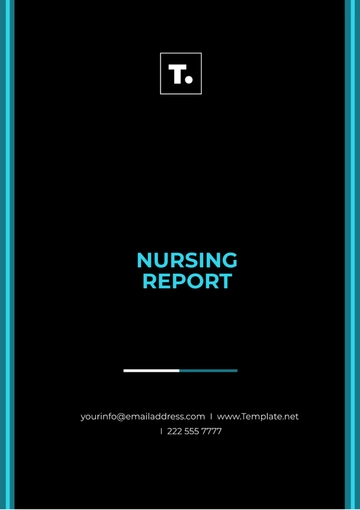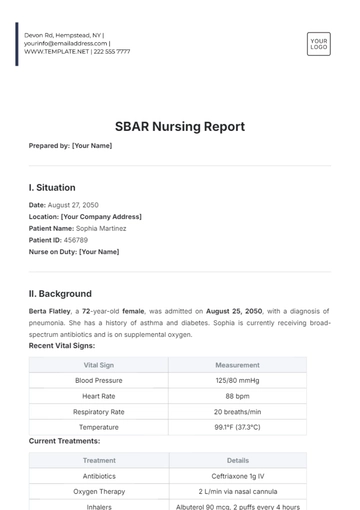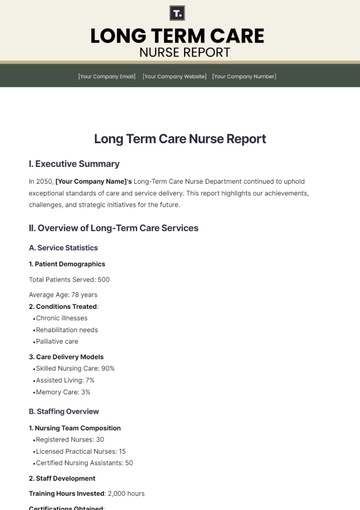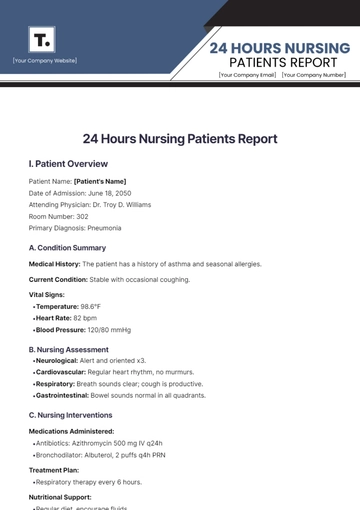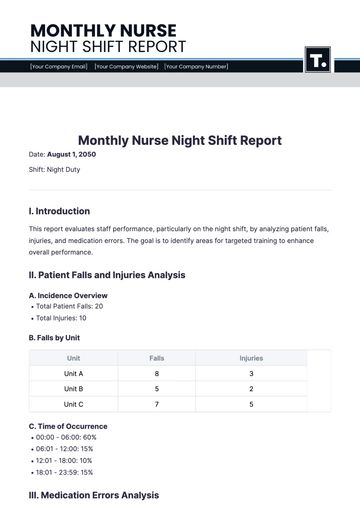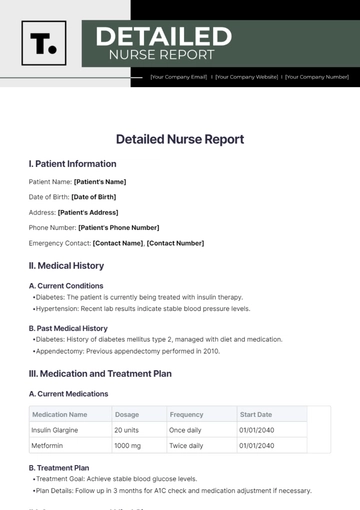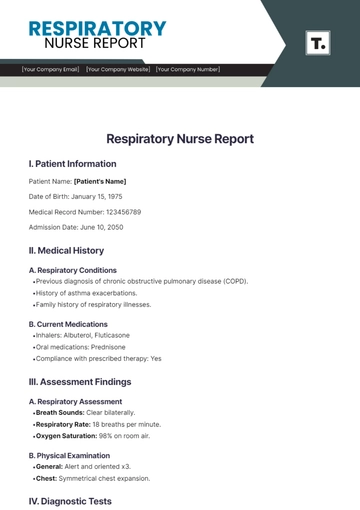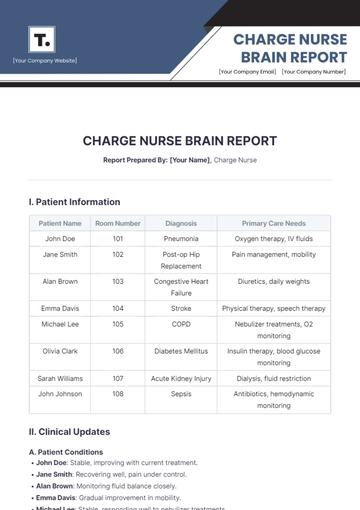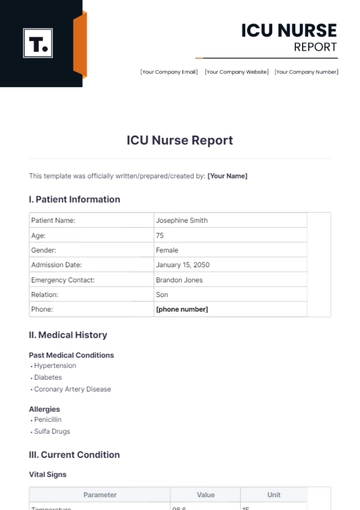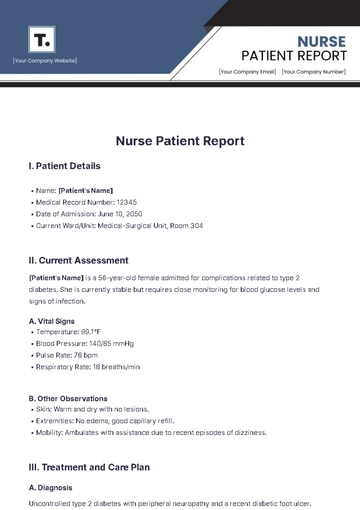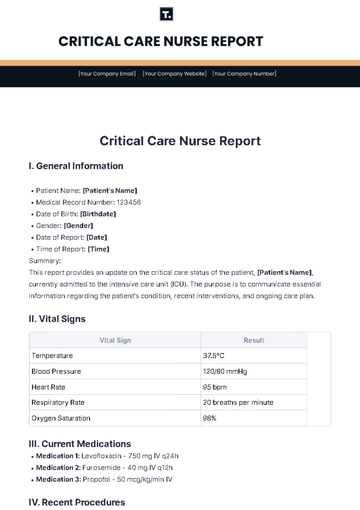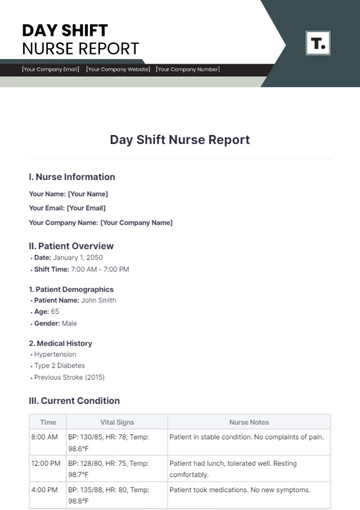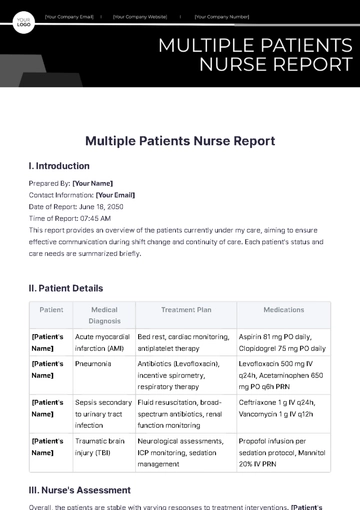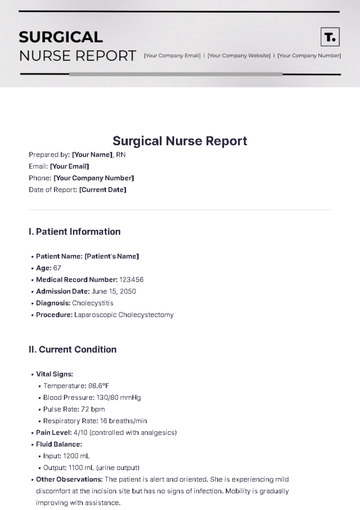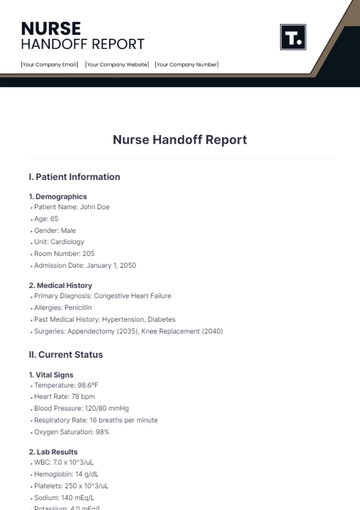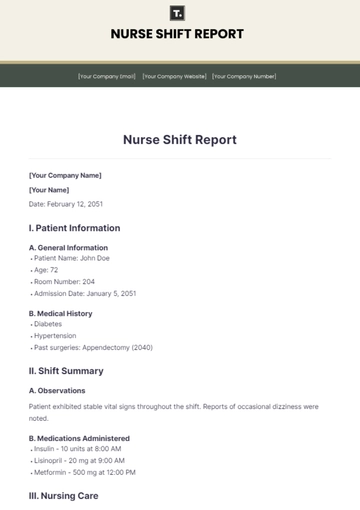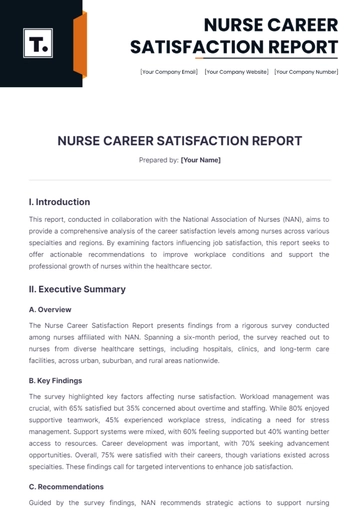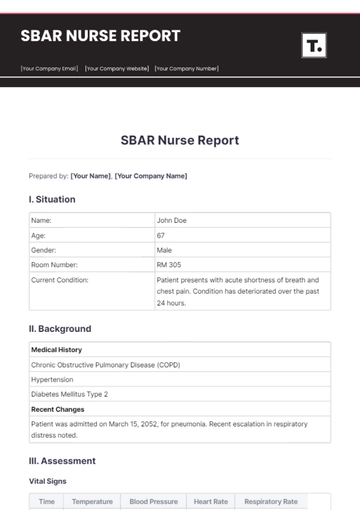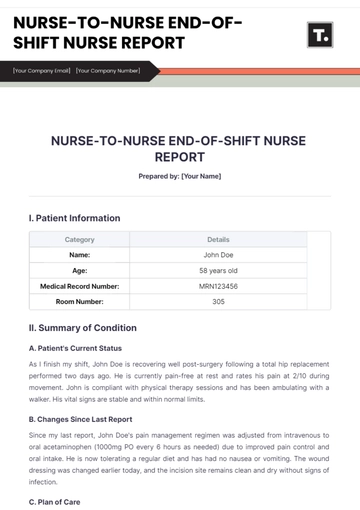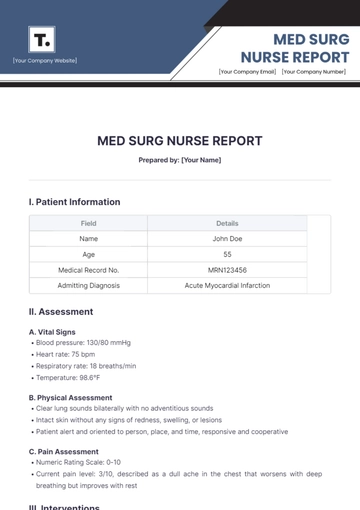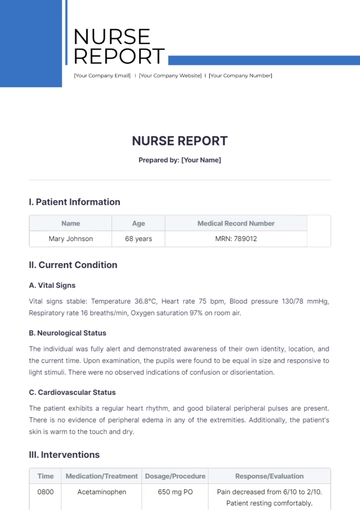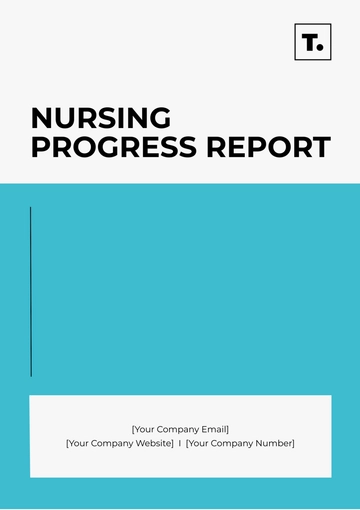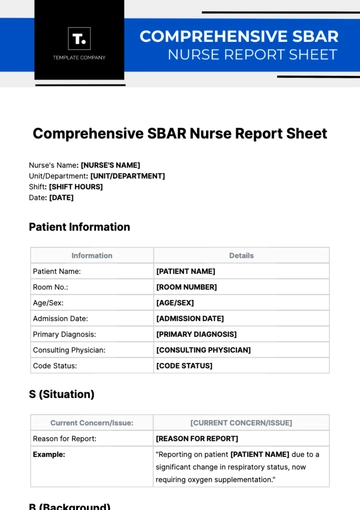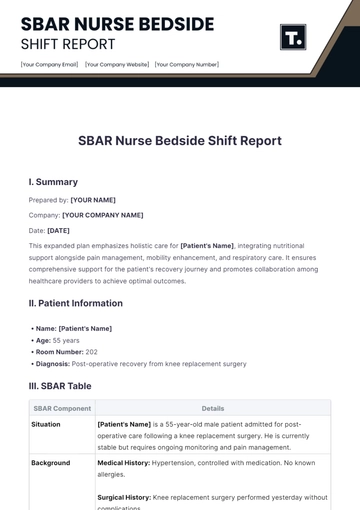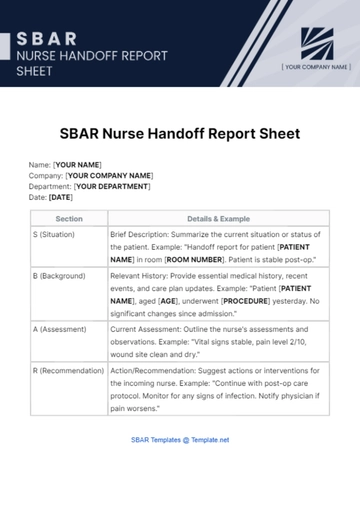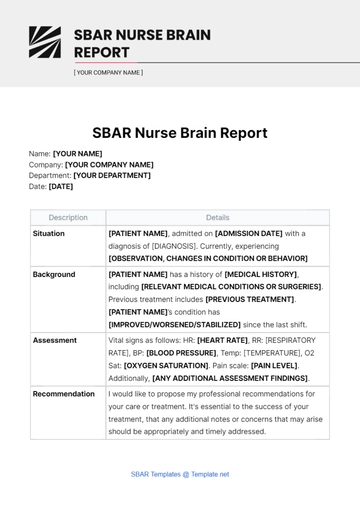Free Med Surg Nurse Report
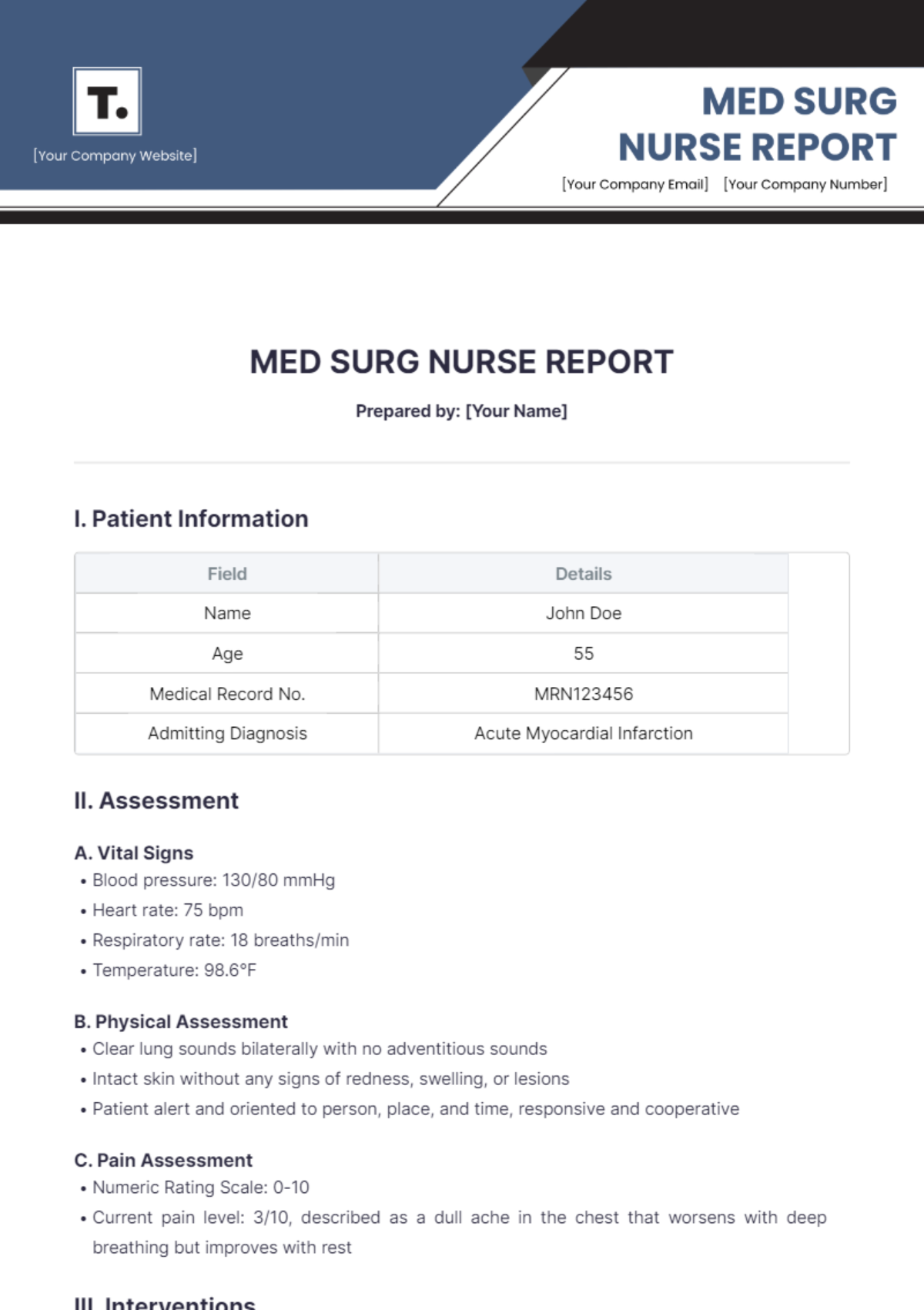
Prepared by: [Your Name]
I. Patient Information
Field | Details |
|---|---|
Name | John Doe |
Age | 55 |
Medical Record No. | MRN123456 |
Admitting Diagnosis | Acute Myocardial Infarction |
II. Assessment
A. Vital Signs
Blood pressure: 130/80 mmHg
Heart rate: 75 bpm
Respiratory rate: 18 breaths/min
Temperature: 98.6°F
B. Physical Assessment
Clear lung sounds bilaterally with no adventitious sounds
Intact skin without any signs of redness, swelling, or lesions
Patient alert and oriented to person, place, and time, responsive and cooperative
C. Pain Assessment
Numeric Rating Scale: 0-10
Current pain level: 3/10, described as a dull ache in the chest that worsens with deep breathing but improves with rest
III. Interventions
Time | Medication Administered | Treatment/Procedure |
|---|---|---|
08:00 | Nitroglycerin 0.4 mg sublingual | Administered for chest pain relief |
10:30 | Aspirin 325 mg PO | Given for antiplatelet effect |
13:00 | Morphine 2 mg IV | Administered for persistent chest pain |
IV. Response to Treatment
Time | Assessment of Response | Changes in Condition |
|---|---|---|
09:00 | Chest pain relieved after nitroglycerin | Pain scale reduced to 1/10, patient more comfortable and able to breathe easier |
11:00 | Aspirin taken without adverse effects | No significant changes observed in pain or vital signs |
14:00 | Morphine provided partial pain relief | Pain reduced to 2/10, patient resting comfortably with improved ability to move |
V. Plan of Care
A. Nursing Care Plan
Goals for the shift: Monitor cardiac status closely for any signs of arrhythmia or ischemia
Anticipated Interventions: Continuous ECG monitoring, hourly pain assessment, and reassessment
B. Physician Orders
Pending orders: ECG, cardiac enzyme levels (troponin)
Completed orders: Initiated nitroglycerin drip as per protocol for persistent chest discomfort
C. Patient Goals
Short-term goals: Achieve and maintain pain relief, stabilize cardiac condition to prevent further ischemic episodes
Long-term goals: Patient education on cardiac rehabilitation and lifestyle modifications to reduce cardiovascular risk factors
VI. Communication
A. Healthcare Team
Discussions with: Cardiologist, intensivist
Concerns raised: Need for ongoing pain management strategy due to persistent discomfort despite initial interventions
B. Family Members
Family involvement: The wife present during admission, updated on the patient's condition, and involved in care decisions
Education provided: Educated on signs of heart attack recurrence, the importance of medication adherence, and recognizing early symptoms
C. Ancillary Services
Consultations requested: Cardiac catheterization scheduled for tomorrow morning to assess coronary artery status
Results received: Pending, awaiting catheterization findings to guide further treatment decisions
VII. Education
Topic | Details |
|---|---|
Medication | Detailed explanation of nitroglycerin use, emphasizing proper administration technique and potential side effects such as headache and hypotension |
Condition Management | Emphasized importance of rest, stress reduction, and adherence to prescribed medications to optimize cardiac function |
Lifestyle Modifications | Discussed dietary changes focusing on low-sodium and heart-healthy diet, smoking cessation advice, and regular aerobic exercise recommendations |
VIII. Follow-Up
Date | Follow-Up Action |
|---|---|
2 days post-discharge | Follow-up appointment scheduled with cardiologist for review of cardiac catheterization results and adjustment of medication regimen |
1 week post-discharge | Cardiac rehabilitation referral initiated for a structured exercise program and ongoing education on heart health management |
IX. Recommendation
Further assessments: Monitor cardiac enzymes closely post-catheterization to detect any signs of myocardial damage
Discharge planning: Arrange home health care services for ongoing cardiac monitoring and support, ensure patient and family education materials are provided
- 100% Customizable, free editor
- Access 1 Million+ Templates, photo’s & graphics
- Download or share as a template
- Click and replace photos, graphics, text, backgrounds
- Resize, crop, AI write & more
- Access advanced editor
Streamline your patient handovers with the Med Surg Nurse Report Template from Template.net. This customizable and editable template ensures accurate and efficient reporting. Perfectly editable in our AI Editor Tool, it allows you to personalize every detail to meet your specific needs, enhancing your workflow and ensuring seamless communication within your medical team.
You may also like
- Sales Report
- Daily Report
- Project Report
- Business Report
- Weekly Report
- Incident Report
- Annual Report
- Report Layout
- Report Design
- Progress Report
- Marketing Report
- Company Report
- Monthly Report
- Audit Report
- Status Report
- School Report
- Reports Hr
- Management Report
- Project Status Report
- Handover Report
- Health And Safety Report
- Restaurant Report
- Construction Report
- Research Report
- Evaluation Report
- Investigation Report
- Employee Report
- Advertising Report
- Weekly Status Report
- Project Management Report
- Finance Report
- Service Report
- Technical Report
- Meeting Report
- Quarterly Report
- Inspection Report
- Medical Report
- Test Report
- Summary Report
- Inventory Report
- Valuation Report
- Operations Report
- Payroll Report
- Training Report
- Job Report
- Case Report
- Performance Report
- Board Report
- Internal Audit Report
- Student Report
- Monthly Management Report
- Small Business Report
- Accident Report
- Call Center Report
- Activity Report
- IT and Software Report
- Internship Report
- Visit Report
- Product Report
- Book Report
- Property Report
- Recruitment Report
- University Report
- Event Report
- SEO Report
- Conference Report
- Narrative Report
- Nursing Home Report
- Preschool Report
- Call Report
- Customer Report
- Employee Incident Report
- Accomplishment Report
- Social Media Report
- Work From Home Report
- Security Report
- Damage Report
- Quality Report
- Internal Report
- Nurse Report
- Real Estate Report
- Hotel Report
- Equipment Report
- Credit Report
- Field Report
- Non Profit Report
- Maintenance Report
- News Report
- Survey Report
- Executive Report
- Law Firm Report
- Advertising Agency Report
- Interior Design Report
- Travel Agency Report
- Stock Report
- Salon Report
- Bug Report
- Workplace Report
- Action Report
- Investor Report
- Cleaning Services Report
- Consulting Report
- Freelancer Report
- Site Visit Report
- Trip Report
- Classroom Observation Report
- Vehicle Report
- Final Report
- Software Report
